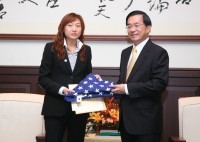News & activities
 News releases
News releases

It is my great delight to have this opportunity to meet with you members of the FAPA Young Professionals Group here at the Presidential Office. I hope that your time here observing the mayoral elections in Taipei and Kaohsiung will prove fruitful.
Next year will mark the 25th anniversary of the founding of FAPA, which, throughout its history, has stood shoulder to shoulder with Taiwan's people and striven on the diplomatic frontline to win the US Congress' support for our struggle for democracy, freedom, and human rights.
Many FAPA members braved the danger of being added to a blacklist of overseas dissidents maintained by the previous government. Some even ran the risk of losing their lives, families, and freedom, in order to assist the people of Taiwan in their fight to bring an end to martial law and to the single-party state, usher in a transfer of power between political parties, and move from authoritarian governance to democracy. Over the past quarter of a century, as the people of Taiwan fought a difficult battle against authoritarianism and pursued democracy, FAPA paralleled these activities by helping to bring these goals to fruition through its efforts in the United States.
Over the next two years, FAPA will focus on promoting a Taiwan-US Free Trade Agreement, enhancing Taiwan's defense capabilities, and pushing for visits to the US by high-level officials from Taiwan. These are also the salient points of our government's diplomatic policies, and I believe that FAPA's efforts will help to substantively enhance Taiwan-US relations as a whole.
At present, the US is engaged in FTA negotiations with a number of Asian countries, including South Korea and Thailand, which are respectively the US's seventh- and ninth-largest trading partners. The economic and trade power of Taiwan, which falls between these two as the US's eighth-largest trading partner, is certainly not less than that of either of them.
What's more, statistics reveal that the purchasing power of Taiwan's people is higher than the sum of the purchasing power of all six Central American signatories to the Dominican Republic-Central America-United States Free Trade Agreement. This shows that a Taiwan-US FTA will not only generate substantial profits for American companies and citizens, but will also create many job opportunities.
It is also noteworthy that the six Central American signatories to CAFTA-DR are all Taiwan's diplomatic allies and staunch friends in Central America. The Taiwan-Guatemala FTA has come into effect, the Taiwan-Nicaragua FTA has been signed, and Taiwan's FTAs with El Salvador and Honduras will be signed soon, as negotiations on these trade pacts have both concluded. Taiwan has also begun consultations on an FTA with the Dominican Republic in October of this year. These close economic and trade partnerships between Taiwan and its Central American diplomatic allies are expected to strengthen the economic and trade relationship between Taiwan and the US.
In working on bilateral trade negotiations, Taiwan and the US still have their differences over such issues as pharmaceuticals, intellectual property rights, and the telecommunications industry. However, these should not become stumbling blocks in the FTA negotiation process, because the ultimate goal of negotiations is to remove trade barriers and reach a greater consensus on economic and trade policies between the two sides. I would like to take this opportunity to thank FAPA members for their efforts to promote a Taiwan-US FTA.
We would also like to thank our friends in the US Congress for having given long-term support to Taiwan's security and FAPA for its efforts in helping to strengthen that support. In 2000, FAPA's promotion of the Taiwan Security Enhancement Act led to the US House of Representatives voting overwhelmingly in favor of the bill. After China passed its so-called anti-secession law and as the European Union considered lifting its arms embargo on China, FAPA called on the US Congress to introduce and pass resolutions condemning China's military ambitions.
Besides military intimidation, China has also been doing all it can on the diplomatic front to squeeze Taiwan's room to conduct activities in the international sphere. Despite this, FAPA has worked tirelessly over the years to promote visits by high-level officials from Taiwan to the US. I would like to thank FAPA for helping to get resolutions in support of this introduced and passed in the US Congress many times over these years, and for calling on US Congressmen to send letters to President Bush requesting that the executive branch of the US government end its ban on such visits.
The most critical pillars upholding Taiwan's position in the international community are the democracy, freedom, peace, and respect for human rights found here. Our commitment to these universal values is what has connected us with other developed countries in the world community of democracies. The older generation of FAPA members acted as the front line for diplomatic work in the US Congress. Their work helped turn this nation into a true democracy. We hope that, through continuing to work with our friends in FAPA and its Young Professionals Group, we will soon be able to break through Communist China's diplomatic blockade against democratic Taiwan and earn for Taiwan the recognition within the international community it rightfully deserves.
I know that you have brought me an American flag that once flew over the US Capitol and a souvenir containing a model of the White House. Though I am still not permitted to visit Washington, DC, I thank you for bringing these tokens of the US capital with you to Taiwan.
In closing, I would like to wish you health, happiness, and great success. Thank you.


